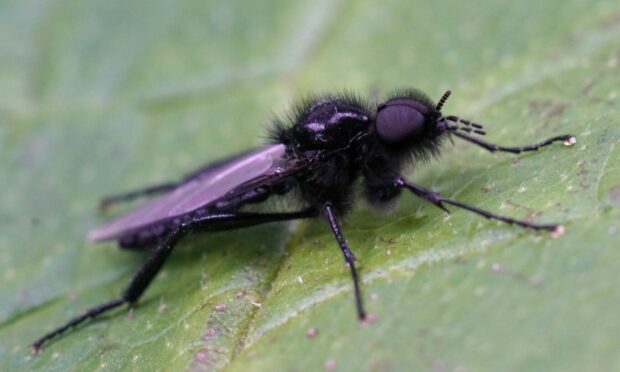We need to talk about St Mark’s flies. I encountered scores of these in the garden. They’re odd black beasties, hovering in the air, with their long back legs dangling down.
It was a sunny day. I’d succumbed to Covid at last and, after a bad night and miserable awakening, found succour standing in the sunshine.
The garden was quiet on a Sunday morning, the calm before The Droning: the village-wide, industrial racket of horticultural machinery.
At least the flies were quiet. They’re called St Mark’s flies because they emerge from eggs in the soil around April 25, the saint’s day, and start flying hither and yon in May.
The invasion of the flies
They can be disconcerting at first, as they are so many, and they take an interest in your heid.
One was determined to go up my trouser leg too and, when I shooed it away, it tried getting into my shoe. Eventually, it settled for sitting under a leaf of grass within my comforting vicinity.
The friendly female blackbird joined the gang too, rooting about in a nearby border, having luck with worms or grubs.
It’s odd: as in my last house, I never encounter worms in the soil now. Are they on the decline because they don’t agree with the bags of garden centre compost that we empty into the land?
A feminist fly movement?
After mating, female St Mark’s flies lay their eggs in the soil and then selflessly die.
You’d think they might wonder: is it worth it? Any females they give birth to must go through the same thing.
What if they just said: enough is enough! Time for a feminist St Mark’s fly movement, methinks.
As for the males, a funny thing about them is that their eyes are split into two, each section having a separate connection to the brain.
The disco-equipped fly
The top half looks out for females, while the lower part monitors their position in relation to the ground. This could be a useful facility for chaps at the disco.
Life, we know, is short. For St Mark’s flies it’s only a week. Consequently, few of them take out mortgages, and their diaries are slim.
Online, you find folk worried or irritated by the swarms, but they play their part in the ecosystem, feeding on nectar and pollinating fruit trees and crops.
Everything in life seems to have a purpose, though I’ve yet to find mine. Moaning about everything maybe.
But I didn’t moan about the St Mark’s flies. They were an interesting addition to the garden, though they’d probably get on your wick if they hung around longer than a week.
After the flies, the wasps
Soon, the wasps will be back. They nested in one of the unused bird boxes on the garden shed last year, and will probably do the same in the other one this year (they never nest in the same place twice).
If you don’t bother them, they don’t bother you and, again, they play a part in the ecology of the place, keeping down pests.
The best thing I can do ecologically is to preserve the conditions that allow birds, bees, butterflies, wasps and other insects to prosper.
Perhaps that’s my purpose in life, both in the garden and generally: just stay out of the way.
